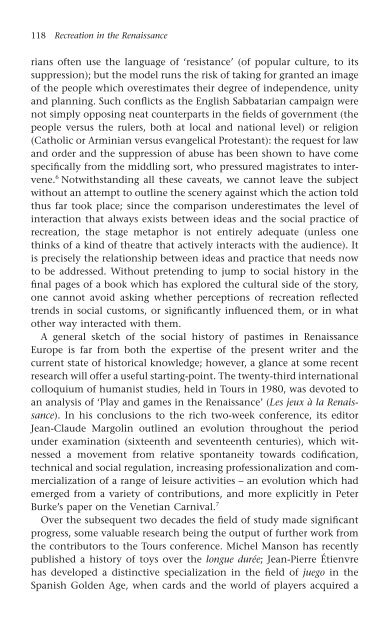Recreation in the Renaissance
Recreation in the Renaissance
Recreation in the Renaissance
- No tags were found...
You also want an ePaper? Increase the reach of your titles
YUMPU automatically turns print PDFs into web optimized ePapers that Google loves.
118 <strong>Recreation</strong> <strong>in</strong> <strong>the</strong> <strong>Renaissance</strong><br />
rians often use <strong>the</strong> language of ‘resistance’ (of popular culture, to its<br />
suppression); but <strong>the</strong> model runs <strong>the</strong> risk of tak<strong>in</strong>g for granted an image<br />
of <strong>the</strong> people which overestimates <strong>the</strong>ir degree of <strong>in</strong>dependence, unity<br />
and plann<strong>in</strong>g. Such conflicts as <strong>the</strong> English Sabbatarian campaign were<br />
not simply oppos<strong>in</strong>g neat counterparts <strong>in</strong> <strong>the</strong> fields of government (<strong>the</strong><br />
people versus <strong>the</strong> rulers, both at local and national level) or religion<br />
(Catholic or Arm<strong>in</strong>ian versus evangelical Protestant): <strong>the</strong> request for law<br />
and order and <strong>the</strong> suppression of abuse has been shown to have come<br />
specifically from <strong>the</strong> middl<strong>in</strong>g sort, who pressured magistrates to <strong>in</strong>tervene.<br />
6 Notwithstand<strong>in</strong>g all <strong>the</strong>se caveats, we cannot leave <strong>the</strong> subject<br />
without an attempt to outl<strong>in</strong>e <strong>the</strong> scenery aga<strong>in</strong>st which <strong>the</strong> action told<br />
thus far took place; s<strong>in</strong>ce <strong>the</strong> comparison underestimates <strong>the</strong> level of<br />
<strong>in</strong>teraction that always exists between ideas and <strong>the</strong> social practice of<br />
recreation, <strong>the</strong> stage metaphor is not entirely adequate (unless one<br />
th<strong>in</strong>ks of a k<strong>in</strong>d of <strong>the</strong>atre that actively <strong>in</strong>teracts with <strong>the</strong> audience). It<br />
is precisely <strong>the</strong> relationship between ideas and practice that needs now<br />
to be addressed. Without pretend<strong>in</strong>g to jump to social history <strong>in</strong> <strong>the</strong><br />
f<strong>in</strong>al pages of a book which has explored <strong>the</strong> cultural side of <strong>the</strong> story,<br />
one cannot avoid ask<strong>in</strong>g whe<strong>the</strong>r perceptions of recreation reflected<br />
trends <strong>in</strong> social customs, or significantly <strong>in</strong>fluenced <strong>the</strong>m, or <strong>in</strong> what<br />
o<strong>the</strong>r way <strong>in</strong>teracted with <strong>the</strong>m.<br />
A general sketch of <strong>the</strong> social history of pastimes <strong>in</strong> <strong>Renaissance</strong><br />
Europe is far from both <strong>the</strong> expertise of <strong>the</strong> present writer and <strong>the</strong><br />
current state of historical knowledge; however, a glance at some recent<br />
research will offer a useful start<strong>in</strong>g-po<strong>in</strong>t. The twenty-third <strong>in</strong>ternational<br />
colloquium of humanist studies, held <strong>in</strong> Tours <strong>in</strong> 1980, was devoted to<br />
an analysis of ‘Play and games <strong>in</strong> <strong>the</strong> <strong>Renaissance</strong>’ (Les jeux à la <strong>Renaissance</strong>).<br />
In his conclusions to <strong>the</strong> rich two-week conference, its editor<br />
Jean-Claude Margol<strong>in</strong> outl<strong>in</strong>ed an evolution throughout <strong>the</strong> period<br />
under exam<strong>in</strong>ation (sixteenth and seventeenth centuries), which witnessed<br />
a movement from relative spontaneity towards codification,<br />
technical and social regulation, <strong>in</strong>creas<strong>in</strong>g professionalization and commercialization<br />
of a range of leisure activities – an evolution which had<br />
emerged from a variety of contributions, and more explicitly <strong>in</strong> Peter<br />
Burke’s paper on <strong>the</strong> Venetian Carnival. 7<br />
Over <strong>the</strong> subsequent two decades <strong>the</strong> field of study made significant<br />
progress, some valuable research be<strong>in</strong>g <strong>the</strong> output of fur<strong>the</strong>r work from<br />
<strong>the</strong> contributors to <strong>the</strong> Tours conference. Michel Manson has recently<br />
published a history of toys over <strong>the</strong> longue durée; Jean-Pierre Étienvre<br />
has developed a dist<strong>in</strong>ctive specialization <strong>in</strong> <strong>the</strong> field of juego <strong>in</strong> <strong>the</strong><br />
Spanish Golden Age, when cards and <strong>the</strong> world of players acquired a










